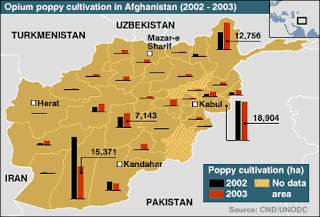 De Los Angeles Times:
De Los Angeles Times:'Afghanistan War Nears "Tipping Point."
Government support is flagging, NATO is split on strategy, and Taliban fighters are revitalized.
Kabul, Afghanistan - The conflict in Afghanistan has entered a dangerous phase, and the next three to six months could prove crucial in determining whether the United States and its NATO partners can suppress a revitalized enemy - or will be dragged into another drawn- out and costly fight with an Islamic insurgency, according to senior military and security officials and diplomats.
"I think we are approaching a tipping point, perhaps early in the new year," said a Western diplomat in the region, speaking on condition of anonymity because he was not authorized to discuss the situation publicly.
Popular support for the central government is faltering, and Western military allies are deeply divided over how best to combat the insurgency.
On the other side of the fight, the Taliban has regained the strength to dominate large swaths of Afghanistan; government control is tenuous at best in at least 20% of the country, according to several Western diplomats and Afghan officials.
Militants have built a network of bases in the tribal hinterlands that straddle the frontier with Pakistan. Over the last year, a growing number of mobile encampments on the Afghan side of the border have given the insurgents greater self-sufficiency, military officials say, although the guerrillas still draw heavily on logistical support and weaponry funneled from the Pakistani side.
"They can come and go pretty much undetected," acknowledged U.S. Army Brig. Gen. Michael T. Harrison Sr., who is overseeing the training and equipping of the struggling Afghan national army.
Observers point to an inexorable upward trend in violence that includes suicide attacks, roadside bombs and border clashes. "We have a bona fide war going on," Harrison said.
A widely cited recent report by the Joint Coordination and Monitoring Board, a panel of Afghan and foreign officials, said such attacks had increased fourfold from last year, killing at least 3,700 people so far in 2006.
A military spokesman in Kabul, the capital, for NATO's International Security Assistance Force, U.S. Army Maj. Luke Knittig, said he did not believe the report accurately reflected long-term trends. But a number of outside experts tracking the trajectory of the conflict supported the panel's assessment of a growing threat.
At stake for the U.S. and its allies with the North Atlantic Treaty Organization is not an outright battlefield defeat by the Taliban and other insurgent groups.
"We should be careful that we don't overstate this militarily unconventional challenge," U.S. Marine Gen. James L. Jones, NATO's supreme allied commander, told reporters last week in Riga, Latvia, where the alliance's leaders were meeting. "We will not be defeated militarily by the Taliban." NATO has 32,000 troops in the country, backed by formidable airpower.
But the patchwork of militant groups battling the Western allies has its own arsenal of strengths.
Insurgent attacks, whose low-tech tactics echo those used against U.S. forces in Iraq, are often ineffectual. But inevitably, some hit home. On Wednesday, for example, two American civilian contractors were killed in a suicide bombing in Kandahar, the sixth such attack in 10 days. Nearly 180 NATO and allied troops have been killed in fighting this year in Afghanistan.'
Lees verder: http://www.truthout.org/docs_2006/120906Z.shtml Of:
http://www.latimes.com/news/nationworld/world/la-fg-insurgency9dec09,0,2649427.story?coll=la-home-headlines




Geen opmerkingen:
Een reactie posten